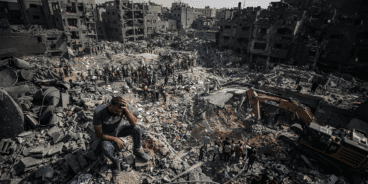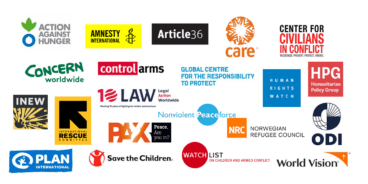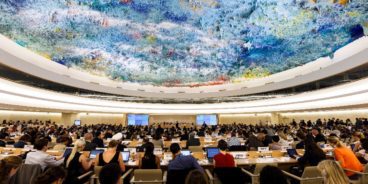
Joint Letter to the Security Council on the Situation in Libya
Populations in Libya face a dire risk of mass atrocities. Attacks on civilians by Muammar Gaddafi’s regime have resulted in untold numbers dead and wounded and have forced hundreds of thousands to flee the country. These attacks, which the Security Council noted in resolution 1970 appear to be widespread and systematic, may amount to crimes against humanity – crimes that member states unanimously agreed to prevent and protect populations from at the 2005 World Summit.
Despite the Security Council’s multiple calls for the Libyan government to uphold its responsibility to protect, the Gaddafi regime is manifestly failing to do so. Reports continue to emerge of the regime using live ammunition against peaceful demonstrators and targeting hospitals and medical personal to prevent the wounded from receiving necessary medical care. Gaddafi’s public statements, including his recent vow to fight to “the last drop of blood” indicate his willingness to continue to commit atrocities in order to retain power. The potential is all too real that he might use air strikes and other heavy weaponry that would lead to large scale casualties.
It is thus critical that member states live up to the commitment they made in 2005. The Security Council’s imposition of an arms embargo, asset freezes, travel bans, and referral of the situation to the ICC through the unanimous adoption of resolution 1970, are positive steps in upholding its responsibility to protect. While these measures are critical in terms of reducing the regime’s long term capacity to engage in violence, they do little to halt attacks currently taking place. Fulfilling the responsibility to protect involves identifying the scenarios whereby civilians may be the victims of mass atrocities, adopting strategies to deter perpetrators from committing future crimes, and crucially, employing protective strategies to halt current attacks.
The wait and see approach is not an option. Libya’s neighbors have been clear that they are prepared to take preventative and protective action with the leader of the Arab League, stating yesterday that “The Arab League will not stand with its hands tied while the blood of the brotherly Libyan people is spilt.” The Security Council must similarly stand ready to protect vulnerable populations in Libya. Council members must, with the assistance of the United Nations Secretariat, actively seek out and review information available to determine the appropriate protective measures and identify those with the capacity to implement them. They must develop contingency plans for a variety of potential developments and be prepared to “take collective action, in a timely and decisive manner … in cooperation with relevant regional organizations,” in keeping with the 2005 World Summit “should peaceful means be inadequate”.
Options for such action may include the creation of a no fly zone, something the Arab League has suggested that it, in conjunction with the African Union, might be willing to impose. The Security Council should also consider what other efforts may prove necessary to protect populations and prevent the commission of atrocities. In determining the appropriateness of military intervention the Security Council should take into account a wide range of factors, notably whether the measure has a reasonable likelihood of successfully halting atrocities and whether the measure is limited to what is strictly necessary for the purpose of halting atrocities. Any military action taken must be conducted in accordance with international humanitarian law and designed to minimize the possible harm to civilians.
The risk of atrocities in Libya remains all too real. The Security Council has invoked the responsibility to protect in both its press statement and resolution 1970 and now must stand ready to authorize the necessary measures to prevent and protect. The world is watching and the Council’s credibility is at stake.
Related Content


2024 Statement by members of the NGO Working Group on the Protection of Civilians
